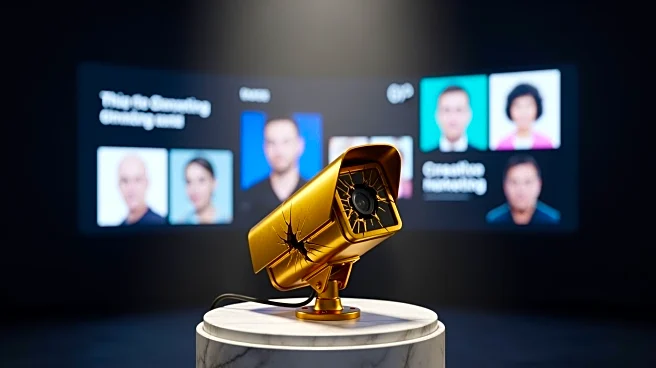What's Happening?
A recent heist at the Louvre Museum in Paris has captured global attention, not only for the audacity of the crime but also for its rapid transformation into a viral internet phenomenon. On October 19, four masked thieves executed a daylight robbery,
stealing nine 'priceless' pieces from the museum in under seven minutes. The stolen items, including Empress Eugénie's diamond-and-gold encrusted crown, are valued at $102 million. The heist has been likened to a scene from a Dan Brown novel or an Ocean's film, and it has quickly become a template for internet memes and marketing campaigns. Brands like IKEA Switzerland and Bӧcker, a German machinery company, have released tongue-in-cheek ads referencing the heist. Meanwhile, social media platforms like TikTok and Instagram have seen a surge in heist-themed content, including Halloween costumes inspired by the event.
Why It's Important?
The Louvre heist highlights the intersection of crime and internet culture, demonstrating how quickly real-world events can be transformed into digital content. This phenomenon underscores the power of social media in shaping public perception and engagement with current events. For businesses, the heist presents an opportunity to engage with audiences through creative marketing strategies that capitalize on trending topics. The event also raises questions about museum security and the protection of cultural heritage, as the Louvre faces scrutiny over its security measures. The heist's viral nature may influence how future crimes are perceived and reported, potentially shifting focus from the criminal act to its cultural and entertainment value.
What's Next?
As the investigation continues, French authorities are working to recover the stolen items and apprehend the thieves. The Louvre's security protocols are expected to undergo significant review and potential overhaul to prevent future incidents. The museum may also face increased pressure to enhance its surveillance systems, particularly in vulnerable areas like the Apollo Gallery. Meanwhile, the internet's fascination with the heist is likely to persist, with more brands and influencers potentially leveraging the event for promotional purposes. The cultural impact of the heist may also inspire new creative works, including films or literature, further embedding the event in popular culture.
Beyond the Headlines
The Louvre heist serves as a case study in the ethical implications of turning crime into entertainment. While the event has provided a platform for creative expression and marketing, it also raises concerns about trivializing criminal acts and their impact on victims. The heist's portrayal as a glamorous or humorous event may detract from the seriousness of the crime and its consequences. Additionally, the rapid dissemination of heist-related content highlights the challenges of managing misinformation and ensuring accurate reporting in the digital age.

















